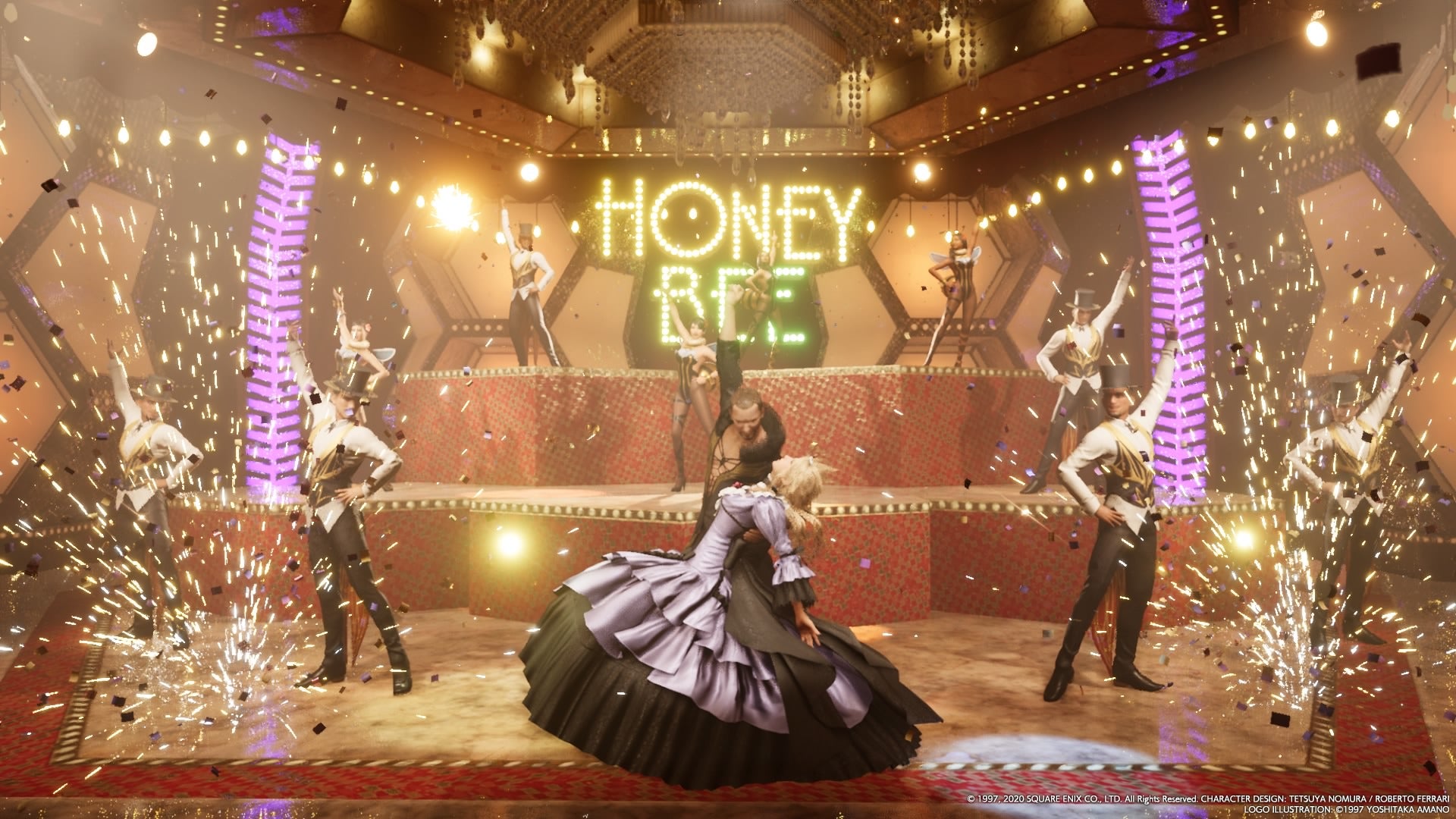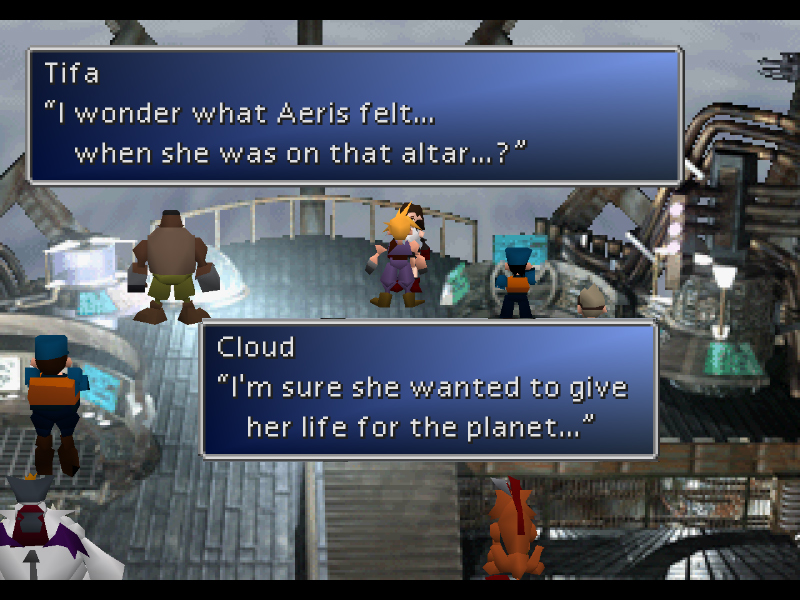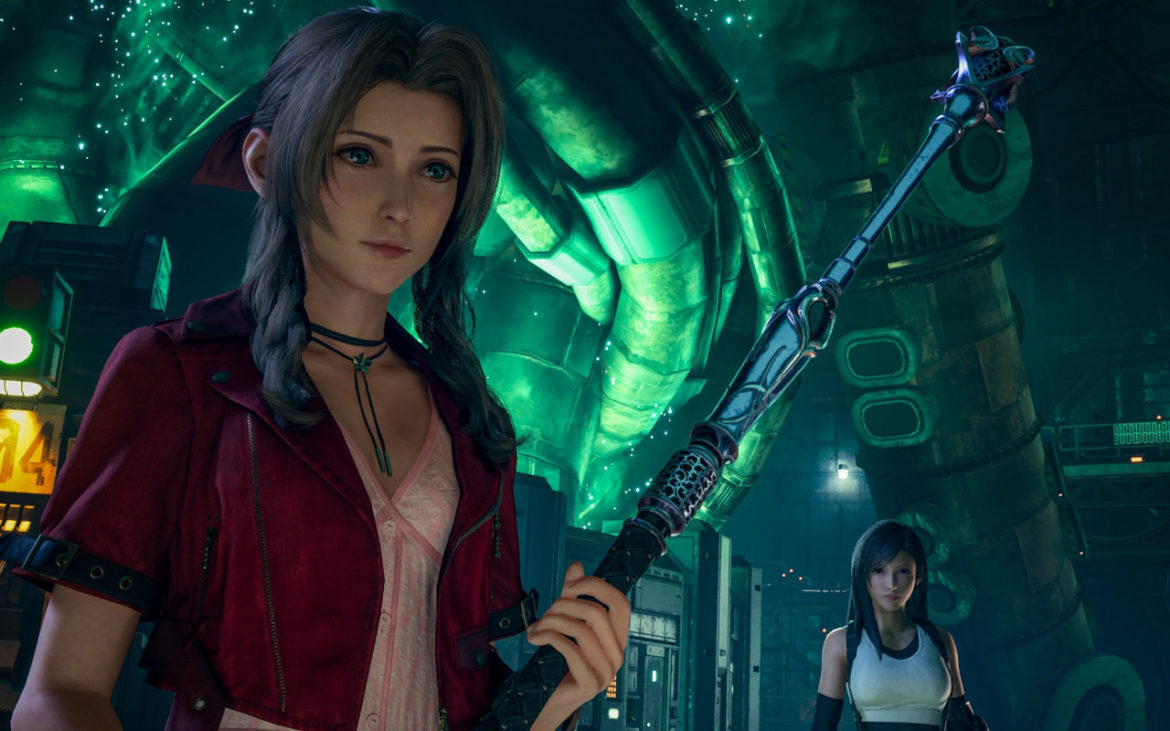Before you read any further, consider this your warning that I’m going to talk in painstaking detail about Final Fantasy VII and Final Fantasy VII Remake and spoil everything.
Since Final Fantasy VII Remake dropped in April, fans have been speculating about what the wild, super off the rails ending means—both for the story being told in Remake and for the broader story arch that stands to unfold over the next however many Remake installments Square Enix is going to force fans to pay for. Okay, that came off salty. I’m actually fully on board for more long, lovingly crafted, highly detailed remake installments.
As an aside, or to provide you more context for my point of view, Final Fantasy VII (the original Playstation game) is hands-down my absolute favorite game of all time. I’ve lost count of how many replays I’ve done. I watch challenge runs of it and in-depth strategy guides. I love watching people break the game and find incredibly creative ways to take down Emerald Weapon. I’ve spent a lot of time considering the broader themes of grief and loss that run through a story which, according to the makers, is a story that is largely about the nature of life and death.
Having said all that, I’m going to risk every Final Fantasy VII fan jumping into my mentions and say this: Final Fantasy VII Remake will not be ruined if Aerith doesn’t ultimately die.
I didn’t come to this conclusion easily and, prior to Remake’s release, was one of the fans who booed every article I saw that confirmed that the remake was going to stray from the original. When the game was announced in 2015, I envisioned the exact same game and experience I’ve been playing since 1997 with beautiful Playstation 4 graphics and voice acting. I was upset when it was announced the game wouldn’t be turn-based. I hated on Square Enix so hard when they announced that Remake would only cover Midgar. I flinched and whined and worried at every twist and turn.
Then, the first trailer dropped, and I started to calm down.
Final Fantasy VII Remake exceeded my expectations. I will admit that the Whispers bugged me, and I still think that that part of the story would be better served by beings that didn’t resemble dementors, but the overall experience was pretty much exactly what I was looking for: gorgeous renderings of every setting in Midgar, down to the last detail. Vivid reimaginings of places like Wall Market. THE. CROSSDRESSING. SIDEQUEST. Monsters from the original, some vamped up and turned into superbosses. Materia! Have I mentioned the crossdressing sidequest? It was a true delight and—given the fact that there hasn’t been much joy to be found in 2020—exactly what I needed to get me through this wild year.

All that said, I’ll be the first to say that the end of Final Fantasy VII Remake left me a bit. . . perplexed. And really, that’s a gentle way to say I was swearing, scoffing, eye-rolling, and raging at my screen as I fought the Giant Kingdom Hearts Fate Monster Thing (no hate, I love Kingdom Hearts, but it was just really disparate from the tone of the rest of the game) and our old pal, Sephiroth. I didn’t WANT to fight Sephiroth in this game, but I get it; the majority of the fandom loves him and wanted to see him in this game. Once I managed to digest everything, I joined the fandom in ruminating on what it all meant. The protagonists basically destroyed fate and ripped a hole in the space-time continuum (or something like that) so the second, third, and potentially fourth installments aren’t beholden to the original storyline of Final Fantasy VII. Inevitably, a vital question emerged:
In this presumed Final Fantasy VII multiverse, is it possible that Aerith won’t have to die?
I’ve seen fans say out and out that if she doesn’t die, it ruins the story, and I had my own initial feelings about that as well. For the probably 5 people who read this article and have no clue what FFVII is all about, Aerith dies midway through the original game and essentially it becomes the surviving heroes’ job to take out the big baddy and enable Aerith to use her connection to the planet to get rid of the meteor that’s hurtling toward the planet. Her death is seen by most fans as being an essential piece of the story that strongly reinforces the theme. But what is that theme exactly?
On its face, the original Final Fantasy VII was this super convoluted story about a man dealing with extreme trauma and having an identity crisis, an alien being and its army of clones, a maniacal villain (who—we find out—is the son of aforementioned alien and Has A Lot Of Feelings about it), and looming over it all is a power-hungry mega evil Super Corporation that basically rules the world. Also, that meteor I mentioned. In short, there’s a lot going on, and it can be difficult to parse through. It was my first RPG, and at the tender age of eleven I wasn’t really able to dig into the layers and fully understand the broader story being told. To me, it’s actually more interesting to set the things like aliens and the morality of eco-terrorism (I forgot to mention that the game starts out with an infamous bombing mission wherein our protagonist joins a group of eco-terrorists, and not because he gives a shit about the planet—he just needs money) as backdrops to a simpler narrative. To me, Final Fantasy VII’s beauty is in its exploration and celebration of what it means to be alive. If you take this approach to the story, Aerith’s death is less about her becoming a martyr for the planet and more about exploring life and loss, and that’s actually more interesting.
Now, I can feel you on the other side of the screen wondering why—if I think her death is interesting and important to the story—I’m fine with her living to see the end of FFVIIR. I’m getting there, I promise.
Final Fantasy VII Remake has gone out of its way to tell us that this is going to be a different story. The familiar things are all still there: the settings, the people, even big moments from the original story, but there’s a different theme bubbling beneath the story’s surface, and I’m not so sure that it’s all going to be about life and loss. This first installment is clearly an exploration of fate, destiny, and choice—words that didn’t show up much in the original game’s script. I’ll admit that there was some exploration of that in the supporting characters’ stories, but I think even those stories leaned more toward identity and life as well.
Nanaki/Red XIII, for example, is quite young by his species’ standards and struggles with his place in life as a guardian of Cosmo Canyon. His father’s legacy weighs heavily on him, and his time being experimented on by Professor Hojo has left him wondering if he’ll lose his sense of self like Cloud does when he gives Sephiroth the Black Materia. Later in the story, when Nanaki’s grandfather, Bugenhagen, passes away, he tells Nanaki, “Look always to the eternal flow of time, which is far greater than the span of human life.” What Bugenhagen is really asking Nanaki to do is to surrender to time, and in so accept that death is a part of being alive. Each of the characters have moments where they consider their own identities and places in life, except Aerith.

Aerith’s story certainly considers life and loss, too. We learn early on that she lost her mother when she was very young. She shares with Cloud that she had fallen in love once before, and that her boyfriend (who we later learn is Cloud’s old friend, Zack—too much to go into there) had disappeared. But the rest of her story doesn’t hinge on the idea that she’s going to have to die to save the world. In Junon, Cloud tells her that he’ll take her for a ride in an airship someday. When Cloud dreams of her after she leaves for the Temple of the Ancients, she insists that she’ll be back. Some may argue that these moments are actually hinting that she’ll be taken from us, and I tend to agree, but it’s also clear that Aerith herself never intended to be a martyr. Tifa even takes a moment to correct Cloud when he beings to muse about it:

Tifa goes on to say:
Really? I wonder? I don’t think that’s it at all. I think she didn’t think she would die at all, but that she planned on coming back all along. She always used to talk about the ‘next time’.
All this to say, when we met Aerith again in FFVIIR, I was so happy to see her. As I played through the game, I took particular joy in seeing her character get more fleshed out. She’s spunky, fun-loving, someone her community looks to for help. She seems sympathetic to Cloud but also doesn’t put up with any of his nonsense. While she asks Cloud to be her bodyguard, it’s clear she’s learned how to take care of herself (and that the bodyguard thing is really a ruse and an obvious flirtation. Charming, but obvious.) If you use her strategically, she’s the strongest character in the game.
Being an Elder Millennial, I had the great good fortune of playing Final Fantasy VII when it was first released, and back in those days the internet was pretty sparse. If you wanted to explore something niche, like video games, there were a handful of webpages and discussion forums dedicated to video them, and those were rife with rumors. The biggest one, of course, was that there was a way to revive Aerith after losing her at the end of Disc 1. I believe that the persistence of that rumor (to this very day, a full ass 20 years later) demonstrates just how badly so many fans WANT that to be a possibility. It’s not, at least in the original game. There are mods you can use to make that happen, though, which is fun. All this to say, if we’re going to go through the trouble of doing a complete, multi-story remake of this game, why NOT use this as an opportunity to grant one of the fandom’s biggest wishes? Sure, it changes the story, and sure, that’s not exactly what a lot of us were hoping for from the start, but what a cool and interesting way to move forward. What an exciting possibility! Personally, I’m looking forward to it.
My hope is that Kitase, Nomura, and the team keep doing what made Remake Part 1 so good: lovingly rendered familiar settings, all those weird enemy encounters—some turned into epic boss battles—and hell, I’d like to see Priscilla and Mr. Dolphin in Junon. I hope they keep the materia system and don’t mess with the battle system. I’ll be a little sad if we don’t get to do the Shinra Parade in Junon or see Barrett in his sailor suit (can they pull off Red XIII trying to walk on two legs in a Shinra Guard uniform?) There’s a lot from the original that I still want to see in this new format. I could make a huge list. I’ll probably make a huge list. But I don’t need to be traumatized by losing Aerith again. I’m actually excited for a new Final Fantasy VII story, or one that parallels the original, but changes a few key moments. All of that is okay with me as a fan (a big one, who is currently planning a kickass Buster Sword tattoo.) Final Fantasy VII has a beautiful, somewhat convoluted, epic story. We will ALWAYS have that, no matter what direction Remake goes in.


Comments are closed.